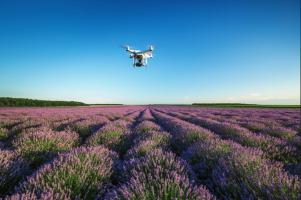Smart farming and food production must accelerate rapidly to keep pace with population growth

Internet of Things (IoT) analyst firm Beecham Research has launched a new report highlighting the importance of harnessing new technologies to address the vital need for sustainable food production to support the current rate of population growth.
The report examines the roles of the many suppliers in the value chain, including technology providers and farm equipment suppliers, as well as the programmes and test beds that are influencing government policies.
It also offers detailed insights into the future of smart farming for strategic and technology planning relevant for mobile network operators, other connectivity providers, sensor manufacturers and software developers specialising in agricultural solutions. The report also examines supply chains and food traceability so will also be of interest to logistics providers, cold chain suppliers and supermarkets.
“The United Nations Food and Agriculture Program has noted that global production of food, feed and fibre will need to increase by 70% by 2050 to meet the demands of a growing global population.” said Saverio Romeo, principal analyst at Beecham Research and co-author of a new report, “This means that, to optimise crop yields and reduce waste, the agriculture and farming industries will need to rely heavily on IoT and M2M technologies moving forward.”

Saverio Romeo
“GPS services, sensors and big data, will all become essential farming tools in the coming years and are clearly set to revolutionise agriculture,” added Romeo.
All this innovation goes under the generic name of precision agriculture, and the results can be game-changing. Greater precision leads to higher yields from the same or smaller resources, creating environmental sustainability. It also allows for much more reliable production and yields, which in turn enables greater management of demand.
Although cost, unpredictable weather events and a demanding and changing legislative environment are some of the challenges facing agriculture, on the other hand economic, business and technological factors are driving adoption of smart farming.
“Whilst precision agriculture cannot solve all the problems, it can help farmers control aspects of farming better and optimise results, as well as provide real time information at a level of granularity not previously possible,” explained Dr Therese Cory, senior analyst at Beecham Research and co-author of the report.
“This enables better, more accurate decisions to be made and results in less waste and maximum efficiency in operations. This particularly matters in an industry where margins can be tight, and savings of a few percent can amount to a great deal of money and precious resources.”

Dr Therese Cory
The report also identifies some of the main challenges and activities where smart farming will have the most impact including: fleet management of farm vehicles, arable farming, monitoring livestock, indoor farming and greenhouses, fish farming, forestry, storage and water monitoring.
Beecham Research also sees sensor-based technologies and decision support systems playing a vital role in the postharvest supply chain. This includes the detection of food fraud, dealing with bacterial and other contamination, mitigating spoilage and food waste, cold chain monitoring and meeting the growing need for traceability from farm to the consumer.
“Precision agriculture can help reduce significant losses in farming, solve problems of data collection and monitoring and reduce the impacts of climate change. In the long term, we have no choice but to invest in the use of precision agriculture and smart farming because of the urgency of the problems the world faces,” concluded Saverio Romeo.
Click this link for an executive summary and to purchase the report ‘Smart Farming: The Sustainable Way to Food’.
Comment on this article below or via Twitter @IoTGN